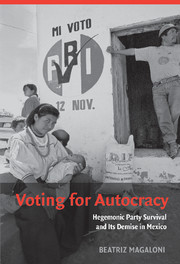Book contents
- Frontmatter
- Contents
- Acknowledgments
- INTRODUCTION
- 1 EQUILIBRIUM PARTY HEGEMONY
- 2 STRUCTURAL DETERMINANTS OF MASS SUPPORT FOR THE PRI
- 3 BUDGET CYCLES UNDER PRI HEGEMONY
- 4 THE POLITICS OF VOTE BUYING
- 5 JUDGING ECONOMIC PERFORMANCE IN HARD TIMES
- 6 IDEOLOGICAL DIVISIONS IN THE OPPOSITION CAMP
- 7 HOW VOTERS CHOOSE AND MASS COORDINATION DILEMMAS
- 8 ELECTORAL FRAUD AND THE GAME OF ELECTORAL TRANSITIONS
- 9 CONCLUSION
- References
- Index
- Cambridge Cultural Social Studies
7 - HOW VOTERS CHOOSE AND MASS COORDINATION DILEMMAS
Published online by Cambridge University Press: 06 August 2009
- Frontmatter
- Contents
- Acknowledgments
- INTRODUCTION
- 1 EQUILIBRIUM PARTY HEGEMONY
- 2 STRUCTURAL DETERMINANTS OF MASS SUPPORT FOR THE PRI
- 3 BUDGET CYCLES UNDER PRI HEGEMONY
- 4 THE POLITICS OF VOTE BUYING
- 5 JUDGING ECONOMIC PERFORMANCE IN HARD TIMES
- 6 IDEOLOGICAL DIVISIONS IN THE OPPOSITION CAMP
- 7 HOW VOTERS CHOOSE AND MASS COORDINATION DILEMMAS
- 8 ELECTORAL FRAUD AND THE GAME OF ELECTORAL TRANSITIONS
- 9 CONCLUSION
- References
- Index
- Cambridge Cultural Social Studies
Summary
What finally allowed Mexican voters to “throw the rascals out” of office? What factors hindered or encouraged opposition coordination in presidential elections? To answer these questions, this chapter presents an analysis of voting choices in the 1994, 1997, and 2000 elections. I systematically test a series of hypotheses on mass support for the PRI derived from my voting model with the use of micro-level evidence.
The Context of the Elections
The 1994 Mexican presidential elections took place after six years of profound economic transformation. The government had removed almost all trade barriers. Mexico had joined the North American Free Trade Agreement, and the country was more fully integrated into international capital markets. Some political commentators and analysts interpreted these elections as a referendum on economic performance. At the time, it seemed that macroeconomic stabilization had been successful, and domestic consumption was booming. The economy, however, was barely growing. Contrary to these views, I find that the electorate reelected the PRI in 1994 despite holding highly negative retrospective assessments of the economy. As they had done in 1988 and 1991, voters exonerated the PRI for mediocre economic performance and chose prospectively, reelecting the incumbent party because they still believed it was more capable of handling the future of the national economy.
The 1994 elections were unique in that they took place during a year of political turmoil, marked by both the Zapatista uprising and the assassination of the PRI's presidential candidate, Luis Donaldo Colosio.
- Type
- Chapter
- Information
- Voting for AutocracyHegemonic Party Survival and its Demise in Mexico, pp. 193 - 226Publisher: Cambridge University PressPrint publication year: 2006



